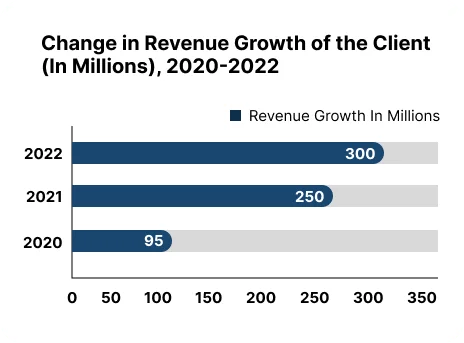Case Study | 29 July 2025
How AI-Powered Modern Diagnostic Solutions Revived a Declining Healthcare Firm
Posted by : Akshay Pardeshi
This case study examines how a former leader in healthcare diagnostics overcame a critical downturn caused by obsolete testing methods and frequent diagnostic inaccuracies. Facing severe revenue decline and loss of credibility, the company collaborated with Research Nester for strategic guidance. By adopting AI-powered diagnostic technologies, the revolutionized its operations, achieving substantial gains in accuracy, operational efficiency, and patient confidence.

An overview:
Established in the late 1980s, the company had helped millions of patients with affordable diagnostic services and was once considered a leader in pathological testing. By 2021, the company started facing steep downfalls in the accuracy of diagnosis and response times due to obsolete testing methods, human-dependent diagnosis, and manual report generation processes. As competitors adopted digital pathology and advanced diagnostic technologies, the company’s weaknesses became increasingly noticeable, leading to a sharp decline in customer retention and loss of several partner hospital contracts. To address the issue, the management consulted Research Nester in 2022 for technology consulting services aimed at AI integration in diagnostic operations. After extensive full-fledged market research and product analysis, AI-powered diagnostic engines were implemented, changing the company’s image, operational model, and profitability.


The Story
The company earned a strong reputation in diagnostic pathology and laboratory testing across North America. Over more than 30 years, the company has built an extensive client network, operating over 400 centers nationwide and forming strategic partnerships with hospitals, insurance providers, and public health agencies. However, it failed to adapt to the rapidly evolving digital healthcare landscape. Between 2017 and 2021, new players in the diagnostics sector introduced automated lab processing, digital pathology, and artificial intelligence (AI)-based diagnostic tools, drastically improving turnaround times and diagnostic accuracy. The company's pathologists were overworked as completion times ranged from 72-96 hours, and error margins were increasing.
By early 2021, patient complaints surged due to delayed test results, improper diagnoses, and report inaccuracies, drawing public attention. Several partner hospitals closed contracts due to the increasing liability associated with inaccurate diagnostics. The final blow came in October 2021, when a group of oncologists raised concerns that pathology reports from the company were returning false-negative cancer screenings in 3 out of 50 cases.
Following a public outcry, an internal audit revealed that out of 10,000 reports reviewed, over 400 had errors ranging from minor discrepancies to major diagnostic oversights. Revenue plummeted from USD 420 million in 2021 to just USD 285 million by the end of 2022. Regulatory warnings further hindered MedoLab’s reputation. Traditional systems were no longer sustainable. That’s when they collaborated with Research Nester to implement an in-depth analysis of rising diagnostic technologies with a special focus on AI-powered solutions.
Our Solution:
At Research Nester, our team conducted an in-depth product analysis to assess AI-driven diagnostic technologies, with a focus on four key areas:
- AI-enabled pathology and radiology solutions
- Machine learning-based image recognition capabilities
- Intelligent workflow automation for diagnostics
- Smooth interoperability with Electronic Health Records (EHRs)
The key challenges detected were:
- Human error in diagnosis due to fatigue or misinterpretation
- Manual transcription of reports is causing delays and inconsistencies
- Limited scalability of operations due to a dependence on manual lab processing
- Absence of data interoperability with hospitals and insurance companies
The Recommended Diagnostic Technology Solutions:
- Advanced Image Analysis Platforms: Incorporation of high-precision image interpretation tools such as DeepMind Health and PathAI, which identify abnormalities in pathology slides with over 98% accuracy, using advanced computational models.
- Automated Report Generation with EHR Connectivity: Application of systems that automatically generate diagnostic reports and seamlessly transfer them into hospital electronic health record platforms, leading to a 60% reduction in turnaround time.
- Intelligent Workflow Management Systems: Adoption of workflow solutions such as Aidoc and Zebra Medical Vision that emphasize critical cases, optimize case handling, and decrease diagnostic backlogs.
- Diagnostic Validation Engine: Implementation of a cross-verification system that compares new diagnostic results with historical patient data to lower false positives and negatives, enhancing reliability and clinical confidence.
Implementation Journey
- Phase 1 (Q1 2021): Pilot Integration
The company selected five major diagnostic centers to test the integration of AI systems. A cloud-based platform was implemented to manage MRI, CT scans, and pathology image analysis. Historical data was also fed to the AI models to improve diagnostic accuracy over time.
- Phase 2 (Q3 2021): Staff Re-Training and Workflow Digitization
Technicians and pathologists went through digital training programs to collaborate effectively with the AI systems. Human professionals analyzed AI-generated results to ensure safe deployment during the initial stages.
- Phase 3 (Q1 2022): Full-Scale Expansion
The AI systems were incorporated across all diagnostic centers. MedoLab launched a patient-facing digital portal that offered live test monitoring, report access, and AI-generated health recommendations for preventing chronic illnesses.


Results
By the end of 2022, the firm had started to restore public trust. Here’s how the transformation took place:
- Revenue went up from USD 285 million in 2020 to USD 345 million in 2022
- Error rates decreased by 87%, resulting in renewed hospital partnerships
- Turnaround time reduced from an average of 72 hours to under 24 hours for most tests
- Operational cost decreased manual labor costs by 28% by using automation
- Net Promoter Score (NPS), indicating customer satisfaction, improved from 21 in 2020 to 68 in 2023
- The AI integration also enabled the company to participate in a government-led early cancer detection program, adding a new stream of revenue and impact.
customized message

Akshay Pardeshi is an accomplished Senior Research Analyst at Research Nester, with over 6 years of experience driving strategy, innovation, and client success across niche industrial domains. His sectoral expertise spans IT & Telecom (cloud technologies, cybersecurity, AI, IoT, 5G infrastructure), Electronics & Smart Devices (consumer electronics, smart home systems, wearables, semiconductors), and BFSI & Allied Services (digital banking, fintech, insurance tech, and IT services).
Akshay specializes in translating complex data into clear, actionable intelligence that informs strategic decision-making. His expertise spans competitive intelligence, market sizing, industry and customer research, trend analysis, and strategic forecasting. He is widely recognized for his rigorous research approach, structured analytical thinking, and ability to deliver high-impact insights that directly support business strategy and growth initiatives.
Akshay holds a Bachelor’s degree in Electronics, which provides a strong scientific and analytical foundation for his work. Throughout his career, he has demonstrated a consistent focus on accuracy, depth of insight, and client-centric delivery. In addition to his analytical strengths, he is highly skilled in project management and team leadership, enabling him to manage complex research engagements efficiently while ensuring timely, high-quality outcomes for stakeholders.
Thank you for contacting us!
We have received your request for proposal. Our research representative will contact you shortly.
Copyright @ 2026 Research Nester. All Rights Reserved.

